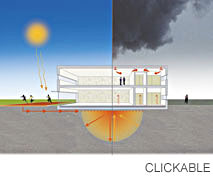ICAX focuses on Renewable Heat and Renewable Cooling
Edward Thompson reflects on the similarities between ICAX's objectives and those of the European E-Hub Project, of which ICAX is a partner. Both are concerned to optimise on-site renewable energy.
Joint Objectives
An Energy Hub is a control system for integrating, maximising and optimising on-site renewable energy resources within a local community: this involves controlling renewable energy capture, storage, control and delivery within districts.
The 16 Energy Hub partners between them are studying the overall concepts, the controls, and business models as well as studying the optimisation of the component parts involved in creating an efficient Energy Hub system. Some of the partners are research organisations and others, like ICAX Ltd, are in business to provide services in renewable energy.
ICAX is concerned in its own business with many aspects that are closely aligned with the wider Energy Hub objectives. The focus of ICAX and of the wider E-Hub objectives can be summarised below:
| E-Hub | ICAX |
| On site renewable energy | On site renewable heating and cooling |
| Capture of renewable energy: road solar collector | Capture of renewable heat: asphalt solar collector |
| Storage of renewable energy: heat storage | Storage of renewable heat using ThermalBanks |
| Control of renewable energy: smart energy control | Control of renewable heat using EMS |
| Delivery of renewable energy through district heating | Delivery of renewable heat using Interseasonal Heat Transfer |
| Smart energy control is used by E-Hub to shift demand towards times of cheaper energy supply | Energy Management Systems are used by ICAX to transfer heat to where it is needed from the most efficient source |
| E-Hub uses price mechanisms to reduce demand at times of expensive supply of energy | ICAX responds to energy prices to reduce the cost of providing renewable heat |
| E-Hub uses agent based technology to match supply and demand for energy within each district | ICAX balances the heating demands and the cooling demands of its customers to save energy and carbon emissions by transferring heat from where it is in surplus to where it is needed: heat recycling |
| E-Hub uses advanced heat storage to save energy when supply exceeds demand, to meet demand when supply is short | ICAX uses Seasonal Thermal Energy Storage to save energy when supply exceeds demand in summer, in order to meet demand for heat in winter |
| E-Hub aims to provide an Intranet of Energy | ICAX provides an Intranet of Heat |
| E-Hub aims to educate and influence consumers of energy to help reduce their demands when the price of supply is high by providing current information | ICAX provides remote telemetry and training to help its customers to reduce their energy consumption and greenhouse gas emissions |
So while the Energy Hub project is primarily concerned with optimising the use of renewable energy (heating, cooling and electricity) across districts, ICAX's focus is on optimising the use of renewable heat (and cooling) within buildings.
So ICAX faces the same challenges as E-Hub, although with a more limited scope (as ICAX does not address electricity) and on a smaller scale (as ICAX focusses on buildings rather than whole districts).
Thermal Energy Storage
A key element for both E-Hub and ICAX is the importance of addressing the holy grail of the renewable energy: thermal energy storage. E-Hub is addressing this issue by studying compact thermal energy storage, distributed energy storage and thermochemical energy storage. ICAX uses underground thermal energy storage to address the same critical issue.
Smart Control Systems
Another key element for both E-Hub and ICAX is the importance of sophisticated controls. E-Hub is addressing this issue by developing a smart energy control system to provide fossil free energy from the most economical source. ICAX has developed its Energy Management System to monitor temperatures available to it from solar collectors, buildings needing cooling, air source heat pumps and ground source energy from ThermalBanks in order to be in a position to transfer energy from the most readily available local source to the destinations where it is required.
Synergies
ICAX is pleased to be contributing to the E-Hub Project and pleased to be involved in the development of ideas which run in parallel with its own objectives.
See Ground Source Heating See Ground Source Cooling See Ground Source Energy
See also: Banking on IHT The Merton Rule Economic Renewable Energy
Recent ICAX projects benefiting from ThermalBanks:
Merton IGC | Suffolk One College | Tesco Greenfield Supermarket | Wellington Civic Centre

